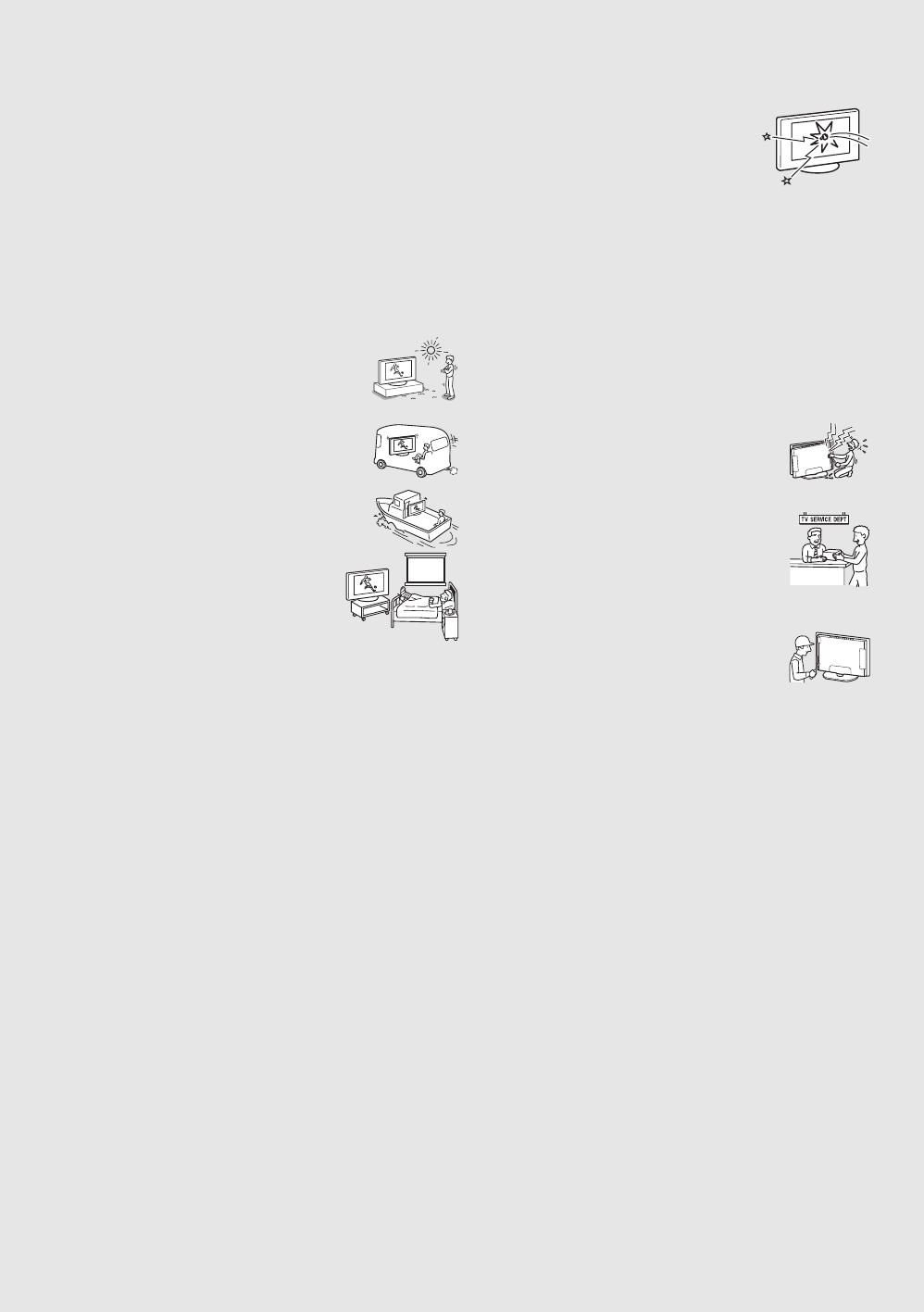
7
s Do not install the TV in a location where it may protrude, such as on
or behind a pillar, or where you might bump your head on it.
Otherwise, it may result in injury.
Preventing the TV from toppling over
Take measures to prevent the TV from toppling over and causing injury.
To prevent the TV from toppling over, secure the TV to a wall or stand.
Placement for viewing
It is recommended to watch the TV at a distance of 3 - 7 times that of the
screen height, and in moderate brightness. Watching the TV for too long
or in a dark room may cause eye fatigue. To obtain a clear picture, do not
expose the screen to direct illumination or direct sunlight. If possible, use
spot lighting directed down from the ceiling.
Outdoor use
Do not install this TV outdoors. If the TV is exposed to
rain, it may result in a fire or an electric shock. Do not
expose the TV to direct sunlight, it may heat up and
become damaged.
Vehicle, ships and other vessels
Do not install this TV in a vehicle.
Bumping of the vehicle may cause the TV to fall down
and cause injury.
Do not install this TV in a ship or vessel. If the TV is
exposed to seawater, it may cause a fire or damage the
TV.
Medical institutions
Do not place this TV in a place where medical
equipment is in use.
It may cause a malfunction of medical equipment.
VOLUME ADJUSTMENT
s Adjust the volume so as not to trouble your neighbors. Sound carries
very easily at night. Therefore, closing the windows or using
headphones is suggested.
s When using headphones, adjust the volume so as to avoid excessive
levels, as hearing damage may result.
LCD SCREEN
s Although the LCD screen is made with high-precision technology
and has effective pixels of 99.99% or more, black dots or bright
points of light (red, blue, or green) may appear constantly on the LCD
screen. This is a structural property of the LCD panel and is not a
malfunction.
s The LCD screen is made with high-precision technology and to
achieve a high level of performance and picture quality, this TV’s
backlight setting is set to maximize the brightness of the TV.
However, uneven brightness may be observed when the LCD TV is
viewed in a dark ambient without an input source or a blank screen.
This condition is normal and not a malfunction of the TV. Changing
the Picture mode, Backlight setting, enabling the Light Sensor, or
turning on the Power management will improve this condition.
s Do not expose the LCD screen surface to direct sunlight. Doing so
may damage the LCD panel.
s Do not push or scratch the LCD screen, or place objects on top of the
TV. The image may be uneven or the LCD panel may be damaged.
s If the TV is used in a cold place, a smear may occur in the picture or
the picture may become dark. This does not indicate a failure. These
phenomena improve as the temperature rises.
s Ghosting may occur when still pictures are displayed continuously. It
should disappear after a few moments.
s The screen and cabinet get warm when the TV is in use. This is not a
malfunction.
s Avoid spraying insect repellent with volatile material on the screen.
s Avoid prolonged contact with rubber or plastic material.
Broken pieces
Do not throw anything at the TV.
The screen glass may break by the impact and
cause serious injury.
If the surface of the TV cracks, do not touch it until
you have unplugged the AC power cord.
Otherwise electric shock may result.
Handling of broken glass and liquid crystal
leakage
If the LCD panel gets damaged, crystalline liquid leakage may occur, or
scattered broken glass may result. Do not touch broken glass or
crystalline liquid which is toxic, with bare hands as cuts, poisoning or
skin irritation may occur. Also, do not let glass fragments or leaked
crystalline liquid get into your eyes or mouth. Should either contact your
eyes or mouth, rinse the contacted area thoroughly with water and consult
your doctor.
SERVICING
Do not attempt to service the TV yourself since opening
the cabinet may expose you to dangerous voltage or other
hazards. Refer all servicing to qualified service
personnel.
Replacement parts
When replacement parts are required, be sure the
service technician certifies in writing that he/she has
used replacement parts specified by the manufacturer
that have the same characteristics as the original parts.
Unauthorized substitutions may result in a fire, an
electric shock or other hazards.
Safety check
Upon completion of any service or repairs to the TV,
ask the service technician to perform routine safety
checks (as specified by the manufacturer) to determine
that the TV is in safe operating condition, and to so
certify. Ask a qualified service technician to dispose of the TV.
For Customers in the United States
Lamp in this product contains mercury. Disposal of
these materials may be regulated due to
environmental considerations. For disposal or
recycling information, please contact your local
authorities or the Electronic Industries Alliance
(http://www.eiae.org).
7


















